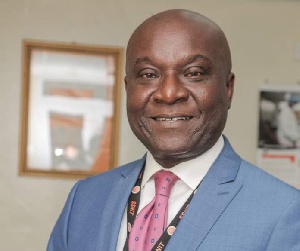 Dr. Darius Osei, General Manager of the Trust Hospital
Dr. Darius Osei, General Manager of the Trust Hospital
The Trust Hospital has introduced a new operational technology, dubbed ‘Electronic Medical Record’ (EMR) that allows the hospital to operate electronically for easy access to patients’ records and updates, as well as to increase revenue.
The EMR also serves as a network system that connects all six clinics and three hospitals dotted across the country. This was done through a fibre-optic technology to allow easy monitoring and communication between branches without physically moving from one clinic to the other.
Dr. Darius Osei, General Manager of the Trust Hospital said: “We have now been able to optimise communication flow between hospital departments, physicians and nurses. We actually reduced the human dependency in some cases, and then improved patient outcome in terms of reduced medical errors. It also enabled paper-free transactions in some cases”.
Since the EMR software – which records and maintains a history of patient visits – is networked, authorised doctors in any of the Trust’s facilities are allowed access to patient’s history, and therefore proper diagnosis and prescriptions are made in a timely manner. This is done by assigning a unique identification number to each patient.
“What this means is that when you visit a Trust Hospital or Clinic at Dansoman today, and you next visit another facility at Adenta in a month’s time, all that will be required is your patient number and any of the authorised doctors or health professionals can take care of you with your history in mind.
“The only thing that changes is your visit number, which corresponds with the days you visit the hospital. However, you have a unique hospital number which means anywhere it is punched – whether by your surname or your first name – it pops out your folder. So, what the next doctor will do is just build on your history because he also has access to your information,” he said.
In terms of management’s operational efficiencies, Dr. Osei noted that it has significantly reduced physical monitoring by executives. “By the click of just a button, it is easy to access all information and updates of the happenings in all our clinics and hospitals. This has reduced our rounds from one hospital to the other for information,” Dr. Osei said.
According to him, the need to upgrade the operational software was due to demands of user-friendliness, flexibility and a commitment to bring only the best available services to their clients.
The EMR has been piloted at the Tema branch of the Trust Clinic to identify challenges and mistakes it may come with. It is expected to roll out by next week in all the other clinics and hospitals. The hospital aims to put the software into full operation by the middle of this year.
Dr. Osei added that the EMR has had a positive impact on the hospital’s revenue generation and eco-friendliness. For example, the Tema branch where it is being piloted has stopped printing folders for patients.
He noted that the hospital will however keep old records for some years, so that they serve as a back-up. The EMR is regulated by the Data Protection Commission, which advised the hospital on how to effectively protect patients’ data from hackers. The hospital also has a firewall system that protects patients’ data from hackers.